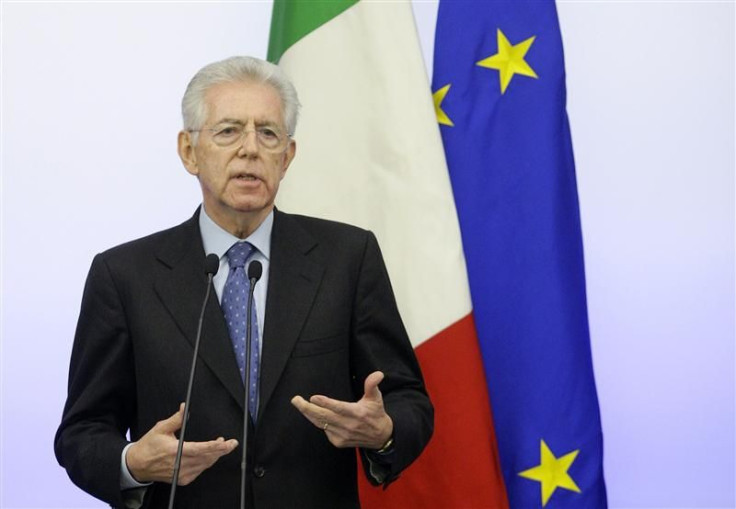Monti Blames 'Northern' Countries For Spiking Bond Yields In Italy, Spain

Italian Prime Minister Mario Monti denounced unnamed northern EU states Sunday for taking positions that contributed to dangerous spikes in borrowing costs for Italy and Spain.
In a clear reference to Finland and the Netherlands, which questioned some decisions made at the June 28-29 euro zone summit hailed as a watershed for the debt crisis, Monti said the unnamed countries were sapping the euro zone's credibility, Agence France-Presse reported.
The hard-won accord in Brussels paves the way for a €500 billion ($630 billion) bailout fund to recapitalize ailing banks directly, without passing through national budgets and, thus, adding to struggling countries' debt mountains.
Finland has said it has no intention of footing the bill to cover the debts of other euro zone countries.
Collective responsibility for other countries' debt, economics and risks -- this is not what we should be prepared for, Finance Minister Jutta Urpilainen said in a newspaper interview.
If somebody wants to help Southern Europe, then it has to be other governments, not the ECB, said Dutch Central Bank President Klaas Knot, a member of the European Central Bank's governing council, taking a similar line.
Speaking during an economic conference in Aix-en-Provence, France, Sunday, Monti also said the return of sovereign bond yields to dangerous levels last seen before the European Union summit in June is a concern that must be addressed by euro zone finance ministers, Reuters reported.
Yields on Spain's 10-year debt rose back above the 7 percent on Friday, as the impact from a EU summit last week faded, while Italy has also seen its yields surge above 6 percent.
The wide level of the spreads on the sovereign debt of several euro zone member states is a concern for the financial stability of the euro zone, Monti said at a news briefing on the sidelines of the conference.
I believe it is also a concern for the efficient transmission of monetary policy throughout the euro area, he added. It is, I believe, needed that the Eurogroup works on this and other items developed at the European Council.
Asked about why Italian and Spanish bond yields had returned to pre-EU summit levels, Monti said, Spreads have widened again because of several factors, I believe; this includes some comments, which I personally think are inappropriate, from political authorities, notably from Nordic countries.
Finland has said that it would block the euro zone's permanent bailout fund from buying government bonds in the open market, while the Netherlands also indicated opposition to the bond-buying idea.
The Eurogroup of euro zone finance ministers will meet in Brussels on Monday and again on July 20, according to French Finance Minister Pierre Moscovici.
The French minister, who met with Monti earlier Sunday, said one has to go further to help Spanish banks and move quickly on tighter banking regulations to speed up bailouts to struggling lenders.
He said he had very convergent views with Monti. We have very confident relations that are going in the same direction.
© Copyright IBTimes 2025. All rights reserved.





















